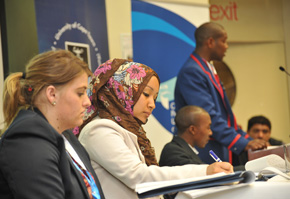Transforming post-secondary education in South Africa
07 August 2012 | Story by NewsroomEngage vociferously with each other and with government education policies, commit to working together and move from being subjects to being active citizens. These are among the pledges taken by student leaders from seven Western Cape tertiary institutions at the New Hope Summit 2012, and event that aimed to flesh out the role of students in the transformation of post-secondary education in South Africa.
 |
 |
| Panel discussion: (from left) Anina Botha, (SRC president, US), Insaaf Isaacs, (SRC president, UCT), Xolela Masebeni (SRC president, Boland College) and Ashley Hartnick, (SRC president, False Bay College) led the discussion on transforming post-secondary education in South Africa. | Grab the opportunity: Dr Mamphela Ramphele implored students to not let the opportunity to make a material difference to South African society slip through their fingers. |
The summit, hosted at UCT on 4 and 5 August, gathered students from UCT, Boland College (BC), False Bay College (FBC), the Cape Peninsula University of Technology (CPUT), the University of Stellenbosch (US) and the University of the Western Cape (UWC) to grapple with that issue in the context of the national Department for Higher Education and Training's (DHET) green paper for post-school education and training, published in early 2012.
It was the third instalment of an annual event at which socially-conscious students put their heads together to discuss their role in shaping a better society. It was also the first time that FET colleges were featured at the summit, with strong suggestions that the roster would be opened to all tertiary students in the Western Cape for future editions.
Delegates grappled with concerns such as access to higher education, funding, unemployment and transformation and social cohesion, drawing up a list of resolutions on those and related matters to present to the DHET.
Timothy McBride of UWC's Further Education and Training Initiative set the scene, leaving the students in no doubt about the severity of the challenges facing education development in the country.
"Only 8% of people in South Africa have access to tertiary education, and 90% of black women in rural areas do not have a matric certificate," he said, citing data from Census 2003: South Africa. "We're hoping you can find a solution to this problem."
UCT vice-chancellor, Dr Max Price, stated that students' input was needed and valued in the drive to fix school and post-school education, which he said was the most important challenge facing South African society. "The aim should be growing [Further Education and Training, ie FET] colleges, because that is what the economy needs," argued Price.
The resolutions adopted by the students at the end of the summit indicated that they agreed with this sentiment.
Chrispin Phiri, president of UWC's Students' Representative Council (SRC), emphasised that an overhaul of the basic-education system held the key to transforming post-school education.
"Transformation is not merely aesthetic," said Phiri. "We need to propose radical solutions like these to ensure there is drastic improvement."
Phiri and his counterparts at UCT and US, Insaaf Isaacs and Anina Botha, endorsed the idea of compulsory community service for new graduates, although the mechanics of such a system was not agreed upon.
Xolela Masebeni, president of the FBC's SRC, expressed concerns that while universities were receiving lots of attention at the summit, the plight of FETs - with a long list of documented challenges - appeared neglected.
"We need to intensify the standard of education offered [at FETs]," urged Masebeni, adding that the possibility of FET-curricula being aligned closer to university-curricula needed to be explored.
Dr Mamphela Ramphele, former vice-chancellor at UCT and founder of the new Citizens Movement for Social Change, said democracy was impossible without an active citizenry, and agreed with her fellow speakers that students should be tenacious in their activism.
"The young people in 1976 said, 'there is no path, but we are going to leave a trail'," related Ramphele. "You now have a much easier environment to leave a trail."
Fadzai Chitiyo, undergraduate academic chair for UCT's SRC, warned that official student leaders were not the only stakeholders on campuses. She argued that the student voice would be most effective when the broader student population mobilises on key issues facing society.
 This work is licensed under a Creative Commons Attribution-NoDerivatives 4.0 International License.
This work is licensed under a Creative Commons Attribution-NoDerivatives 4.0 International License.
Please view the republishing articles page for more information.










